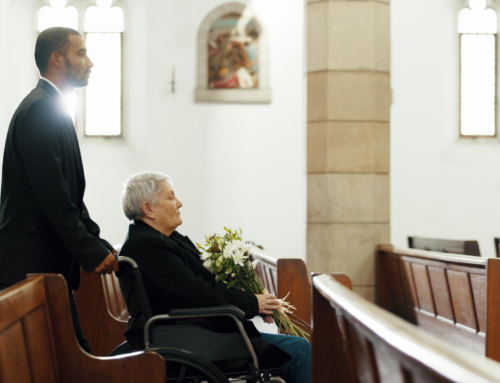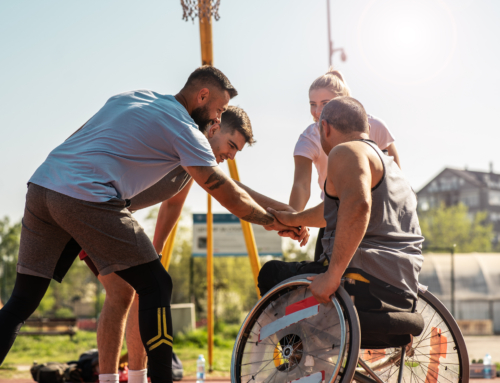Recently I have been reflecting on how the wisdom of Isaiah 57 might inform our approach to accessibility and how this might relate to my life as well as the lives of people with intellectual or developmental disabilities post pandemic. You can also find this article published as Preparing the Post COVID-19 Road in the Christian Business Directory online.
“Build up, build up, prepare the road!
Remove the obstacles out of the way of my people.”
For this is what the high and exalted One says—
he who lives forever, whose name is holy:
“I live in a high and holy place,
but also with the one who is contrite and lowly in spirit,
to revive the spirit of the lowly
and to revive the heart of the contrite.”
Isaiah 57:14-15 NIV
These verses remind me of the need for a barrier-free society, so that people can participate in church life and encounter one another in communities across Canada. Isaiah’s reference to “the road” rather than a particular place, suggests to me that barrier free business or barrier free community is not represented in an event so much as a journey. Accessibility may be improved for people with mobility challenges through the construction of ramps and elevators rather than stairs. Making materials available in braille, large print or by electronic means might reduce barriers faced by people who cannot see. Sign language interpretation, a hearing loop and good lighting for people who can lip read might reduce the barriers of the deaf and people who are hard of hearing. Decreasing sensory input may improve the experience of people who have sensory overload or difficulties with sensory integration. Another feature of a business or community working toward accessibility is one that practices support and compassion for psychiatric survivors who experience a different reality. None of these advancements on their own will make a business or a community barrier free. Taken together however, a barrier free business, or community may become a reality.
Isaiah’s exhortation to build a society that is barrier free, is paralleled by reference to our Holy God, one who is worthy of the highest place and yet chose to lower themselves and remove the barriers between God and humanity, so they could be close to those who are hurting. This measure underscores a business or community that is truly barrier free; one that is characterized by empathy and mutual understanding.

Whether your church or business is currently thriving or barely surviving it is likely that the tragedy of the global pandemic has touched you in some way. If you have lost loved ones, business, jobs, time with family, worship in community, a sense of normalcy, predictable routine, the ability to travel or are hurting in any other way, know that God seeks to join you on your journey.
I am a Canadian who lives with a physical disability. Like many people who have intellectual or developmental disabilities and use Christian Horizons services, I am at high risk of contracting COVID-19 and not recovering. Therefore, I have been self isolating and staying at home as much as possible since March 2020. When local communities went from yellow, to orange, to green, to grey zones and back again. I continued to stay home knowing that if I ventured out and was exposed to the virus, my risk of mortality would be extremely high. Moreover, I would be putting the lives of the people assisting me with essential tasks at risk. The risks may increase depending on the number of people that live together, and the extent of everyone’s support needs. Yet, as we near the end of this pandemic and I reflect on my journey, I thank God for the many new ways that we can do business and build community.
Pre-pandemic I would spend at least half an hour on the phone with parallel transit service representatives each day, trying to schedule rides a week in advance, hoping that I would get where I needed to go in a reasonable timeframe. Another hour of each day, would be spent waiting for the parallel transit service, praying that I was not passed by. Such fear is relatively common to Canadians who require accessible transportation and yet I would get so frustrated feeling like I was the only one with a lack of spontaneity, and somehow everyone had to find a way to accommodate me.
There was a time when physical distancing or self isolation would have formed a barrier to doing business or being in community. I do miss the opportunity to board public transit; join with coworkers in the office, share food in the lunchroom, sing, shake hands or hug at church, go to the movies or a restaurant with friends. However, I thank God for videoconferencing platforms; these innovations mean that geographical distance may no longer be a barrier to connecting with employers, friends, or family.
Virtual platforms are not necessarily barrier free, but they are certainly more accessible to me. If I want to do something or meet with someone, I no longer worry about how I will get there. I can join work, go to church and volunteer virtually anywhere. What’s more, stipulations like “essential trips only,” masks and lineups have helped everyone to understand the challenges posed by a lack of spontaneity. I attribute these unexpected advancements on the road to a barrier free society, to God’s power to transform our mourning into dancing and our sorrows into joy.
This pandemic may soon be over, but for almost 20% of Canadians who experience some form of disability, the practice of self isolation and physical distancing will not necessarily end. As businesses, churches and community spaces begin to reopen, remember Isaiah 57:14 – 15.
Consider your next step on the journey toward accessibility. Since everyone’s needs are different a key might be flexibility and versatility, maintaining as many options as possible, striving to serve others both in person and online. It can be beneficial to ask people what they need, especially if you are willing to bring it to their porch. Together we can work to remove the obstacles out of the way of God’s people!


